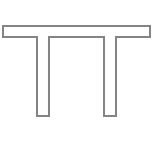Britta Fluevog
Britta Fluevog
Britta Fluevog is a third-generation-matriarchal artist; her grandmother was a printmaker, her mother is a mixed media artist, as well as her father, who is a shoe designer. Born in Vancouver, Canada, Estonian-Canadian Artist Britta Fluevog is currently living in Jülich, Germany. Fluevog’s art practice primarily uses weaving and ceramics to create sculpture, and performance pieces. Fluevog completed her Master’s of Fine Art from Emily Carr University of Art and Design in 2015. Her thesis work looked at combining a material-based practice of textiles into the realm of social justice. In 2007, she received her Interdisciplinary Bachelor of Fine Art from the Nova Scotia College of Art and Design University. Upon graduating from her bachelors, Fluevog established a small ceramic co-op in a rural Ghanian village.
Through having an art studio at the epicentre of Vancouver’s Downtown Eastside, Fluevog has been involved with activism around poverty, gentrification, environment, indigenous rights, and housing. Her ongoing interest in borders, refugees and migrants is connected to her maternal grandparents who fled Estonia when the USSR stole the country.
Highlights of Fluevog’s art career have included: being apart of the 2019 tapestry triennial in Łódź, Poland; writing over a dozen wikipedia articles on female artists; participating in a at the Banff Centre; doing a month-long textile study in Peru; protest weaving while living at Occupy Vancouver; and being a part of a family tri-generational exhibition at Basic Inquiry.
PRACTICE STATEMENT
Britta Fluevog’s work brings a strong aesthetic and material-based practice into the realm of social justice. She use weaving, ceramics, performativity and process as manifestations to expand the discourses of textiles and political art. The works of contemporary artists such as Lisa Anne Auerbach, Sara Rahbar, Tanya Aguiñiga, and Tanja Boukal, which are politically radical, influence her practice.
Through the lens of social justice and intersectionality, Fluevog’s work investigates borders, refugees, globalism and capitalism in relation to textiles and makers. Touch, texture and the handmade are explored in relationship to the maker and the performance of making. Local, industrial, and indigenous materials are explored within her work. Her ongoing interest in borders, refugees and migrants is connected to her maternal grandparents who fled Estonia when the USSR stole the country.
Organic shapes, texture, and a plethora of details in the work allow meandering investigations by the viewer and creates art that continually changes. Strong aesthetic and decorative elements in the work are employed to subvert traditional occidental devaluation of these elements particularly in relation to craft materials and women’s work. Through connection to materials and ancient practices, Fluevog aims to challenge global hegemonic capitalism, championing the value of makers.

